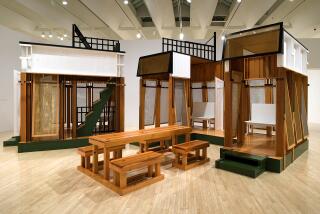World Art Critics to Gather in L.A. : Culture: The group, meeting in the United States for the first time, fosters the exchange of ideas about modern and contemporary art.
- Share via
About 200 art critics from around the world will congregate this week in Los Angeles for the 1991 congress of the International Assn. of Art Critics. The meeting, scheduled for Thursday through Tuesday, is the first time the 43-year-old organization has convened in the United States.
Generally known by its French acronym AICA (Assn. Internationale des Critiques d’Art), the nonprofit association disseminates information about diverse cultures, encourages international exchanges about modern and contemporary art, promotes works of criticism and protects freedom of expression. Annual meetings attract a far-flung array of members who make formal presentations, exchange ideas and absorb as much of the local art scene as time allows.
This year’s conference will address the theme “Beyond Walls and Wars: Politics and Multiculturalism.” Lecture sessions, at the Santa Monica Public Library, will be organized under four topics: “Art, Politics and Ethnicity in a Multicultural World,” “The Politicization of Art and Criticism,” “Censorship and Art” and “Post-Colonial Art and/or Post-Tribal Art: Is it Post-Modern?”
Congress planners had expected some sessions to be open to the public, but the meeting is fully booked and no seats are available, according to New York critic Kim Levin, congress coordinator and president of the association’s American section.
Keynote speakers are June Wayne, an internationally renowned artist and activist who lives in Los Angeles, and Serge Guibaut, a University of British Columbia professor and author of “How New York Stole the Idea of Modern Art.” Members scheduled to present papers include critics from Bulgaria, Romania, Hungary, Poland, Czechoslovakia, Cuba, Brazil, Senegal, South Africa, Turkey, Puerto Rico, Columbia and the Dominican Republic.
Planning the congress has thrust association leaders into “a microcosm of world politics,” Levin said. “We have many more speakers from Eastern Europe than ever before. One is from Estonia, which wasn’t recognized an an independent country until recently. Three speakers are coming from Yugoslavia, but we have received word that they are appearing as individuals, not as representatives of Yugoslavia.”
Scheduled tours for congress participants include visits to local collections and cultural and educational institutions such as the J. Paul Getty Museum, the Santa Monica Museum of Art, Barnsdall Art Park, California Institute of the Arts, Otis Art Institute of Parsons School of Design, the Eli Broad Family Foundation and the Peter and Eileen Norton collection.
The visiting critics also will tour local galleries and the Brewery, an artists residence complex, and Christo’s “Umbrellas” project at Tejon Ranch. Additional trips are available to Watts Towers and East Los Angeles murals, and delegates are expected to make independent visits to many galleries and museums.
Past association meetings have been funded by governments of the host countries, but backing for the Los Angeles congress was patched together from a variety of private sources, Levin said. The J. Paul Getty Trust has made a $15,000 grant for the transportation of participants from Eastern Europe and developing countries. The Lannan Foundation has provided an unrestricted grant for an undisclosed sum. Other foundations have given support and some national airlines have provided transportation for delegates, she said.
“This is the congress that wasn’t supposed to happen. We got a late start, we had no government support, we’ve had to do everything with volunteers and this is a tumultuous time in world politics,” said Levin, who coordinated the meeting with Los Angeles critic Merle Schipper. Program schedules are still in flux, Levin said, but the first delegates have already arrived to meet with their colleagues and assess Los Angeles’ cultural life.
More to Read
The biggest entertainment stories
Get our big stories about Hollywood, film, television, music, arts, culture and more right in your inbox as soon as they publish.
You may occasionally receive promotional content from the Los Angeles Times.










